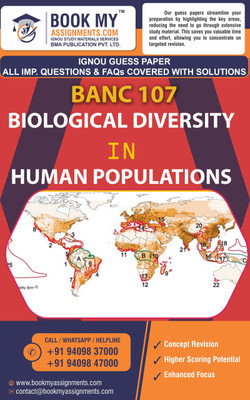IGNOU BANC 107 Biological Diversity in Human Populations Study Material (Guess Paper) For Ignou Student.(Paperback, BMA Publication)
Quick Overview
Product Price Comparison
BANC 107 Biological Diversity in Human Populations Insightful Preparation: This approach offers students deeper insights into their subjects, going beyond mere memorization. It encourages understanding the "why" behind topics, which is crucial for answering IGNOU's application-based questions effectively."BANC 107: Biological Diversity in Human Populations" sounds like an intriguing course that likely explores the biological aspects of human diversity within populations. Here's what you might expect from such a course:Genetic Variation: Studying the genetic diversity among human populations, including variations in DNA sequences, allele frequencies, and genetic markers.Human Evolution: Exploring the evolutionary history of humans, including the processes of natural selection, genetic drift, and gene flow that have shaped human populations over time.Population Genetics: Understanding the principles of population genetics, including Hardy-Weinberg equilibrium, genetic polymorphisms, and the effects of migration and mating patterns on genetic diversity.Race and Ethnicity: Critically examining concepts of race and ethnicity from a biological perspective, considering how these categories have been constructed and how they relate to genetic variation.Adaptation and Environment: Investigating how human populations have adapted to different environmental conditions, including physiological, genetic, and cultural adaptations.Health and Disease: Exploring the role of genetic variation in susceptibility to diseases, as well as the interaction between genetic factors and environmental influences on health outcomes.Forensic Anthropology: Introducing methods used in forensic anthropology to analyze skeletal remains and genetic evidence to infer information about past populations and individuals.Ethical and Societal Implications: Discussing ethical considerations related to the study of human genetic diversity, including issues of consent, privacy, and the use of genetic information in research and healthcare.This course likely offers a comprehensive exploration of the biological foundations of human diversity, providing students with a deeper understanding of the complex interplay between genetics, environment, and culture in shaping human populations. If you have any further questions or need more information, feel free to ask!


